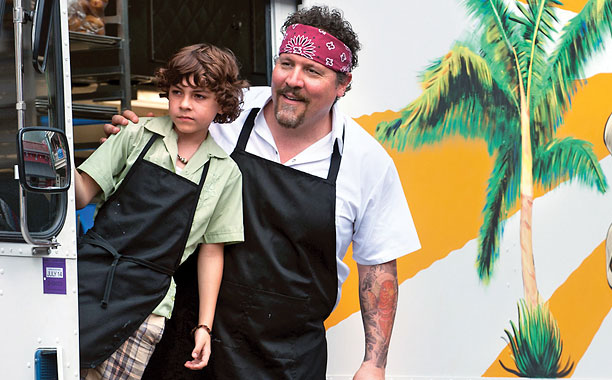It's our last day of Tribeca reviews. Here's Abstew on "Chef"
It is definitely a good time to be a foodie. We live in a golden age where an ingenious pastry chef can fuse together a croissant and a doughnut to create the wonder that is the Cronut. (And then make people wait hours in line for the possibility of a taste.) It's a time where celebrity chefs from shows on The Food Network and Cooking Channel are greeted with the same sort of adoration and enthusiasm once reserved for rock stars. Where food-based reality shows like Top Chef and Hell's Kitchen aren't just niche programming but hugely successful phenomenons. So it's surprising that film hasn't entirely caught up with the trend. But writer/director/and actor Jon Favreau aims to correct that with his culinary-set film, Chef. [more...]
For the first time since 2001's Made, Favreau takes on the triple duty of starring, writing, and directing. The film, in which he plays an acclaimed chef named Carl Casper that found early success in his career but seems to be stalling creatively, can be seen as a not-so-vague parallel to Favreau's own current cinematic career. With 1996's Swingers, Favreau's script signalled the rise of a fresh new voice in film. But after the huge financial success of directing the first two Iron Man films, he scored an epic dud with the wannabe blockbuster Cowboys & Aliens and hit a slump. (Casper's blow-up with an insulting restaurant critic played by Oliver Platt–interestingly enough the real-life brother of New York magazine's food critic Adam Platt–seems like the imaginary scenario Favreau wishes he could have had with all the critics that panned that film). With Chef, his first film since that failure, he seems to be getting back to his indie roots and creating more personal filmmaking.
I wish I could say that the film is a welcome return to form, but like a soufflé that hasn't fully risen, the film never reaches the airy heights it aspires to. Much of it is due to the unbalanced structure of the film which takes entirely too long in setting up the premise. We spend way too much time at the beginning of the film in the LA restaurant that has stifled Casper's creative juices. And we're introduced to characters like Dustin Hoffman's uncompromising restaurant owner, Bobby Cannavale's drunken sous chef, and Scarlett Johansson's front of house hottie that virtually disappear when the film finally gets going. Once the film gains its momentum, after Casper gets his mojo back and sets out on a cross-country trip in a newly acquired food truck, the action becomes rushed and hastily wrapped up.
But what sours the film the most is the inclusion of an overly sentimental storyline about reconnecting with his young son that's as cheesy as the gooey grilled sandwiches the camera lovingly lingers on. And Favreau's attempts to make a heartwarming family film seem at odds with the constant crass language and sexual references that pepper the film. Not to mention its predictability–never for a minute do we doubt where their relationship will end up in the end. Spoiler alert: He learns the errors of his ways and vows to spend more time with his son.

For such an old-fashioned story, the film seems to go out of its way to feel very much in the now. It constantly references social media (Facebook, Vine, and Youtube all get shout-outs), with Twitter playing a huge part in plot and execution. Large tweets even hang over the heads of characters like cartoon thought bubbles. But for a film that is so on the pulse of the digital age, it is surprisingly out of touch with the one thing it should know best: food.
One of the menu items that is berated by Oliver Platt's food critic is a chocolate lava cake that was a hit for Casper in his early days. But lava cakes haven't felt new or exciting since the 1980s. Even Domino's includes them on their menu. It's also foolish to think that a chef of his caliber, in the sort of restaurants he works in, wouldn't have a separate pastry chef in charge of dessert. Also, when Casper gets back to his culinary roots and travels with his food truck, he keeps introducing items on the menu that reflect the city they're in. The last thing New Orleans needs is more po' boys and beignets. They already have the best in the country. I doubt its citizens would be lining up to sample the wares of a chef that just started making them that day.
Audiences may be swayed by the gorgeous food porn, as the film already won the Heineken Audience Award for Best Narrative film at Tribeca. And the appealing supporting cast (including Sofia Vergara as the ex-wife, perpetuating the myth that insanely attractive women love a schlubby guy, John Leguizamo as the loyal line cook, and Iron Man himself in a brief appearance) give the film some needed spice. But as a foodie and movie lover, I wanted something more substantial from the film. Perhaps I'm being as harsh as Platt's food critic, digging into what is clearly a labor of love for Favreau, but he should have spent a little more time preparing before he served up this cloyingly sweet, half-baked confection. C
